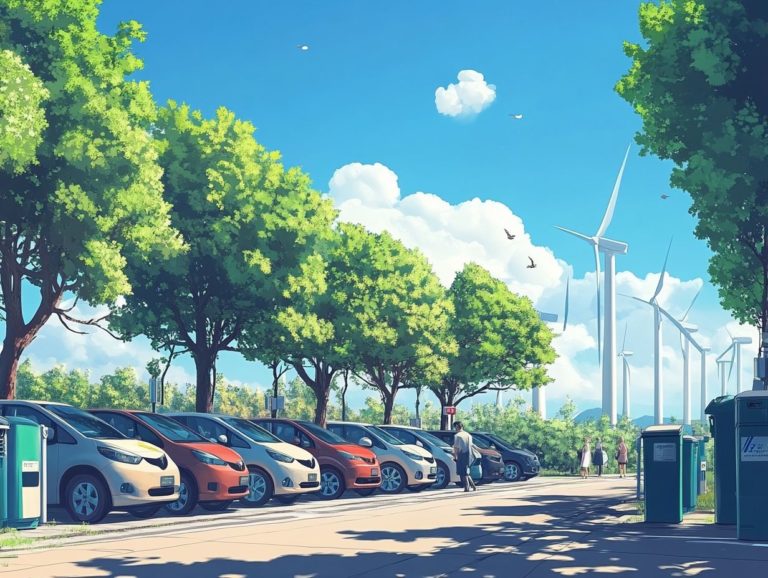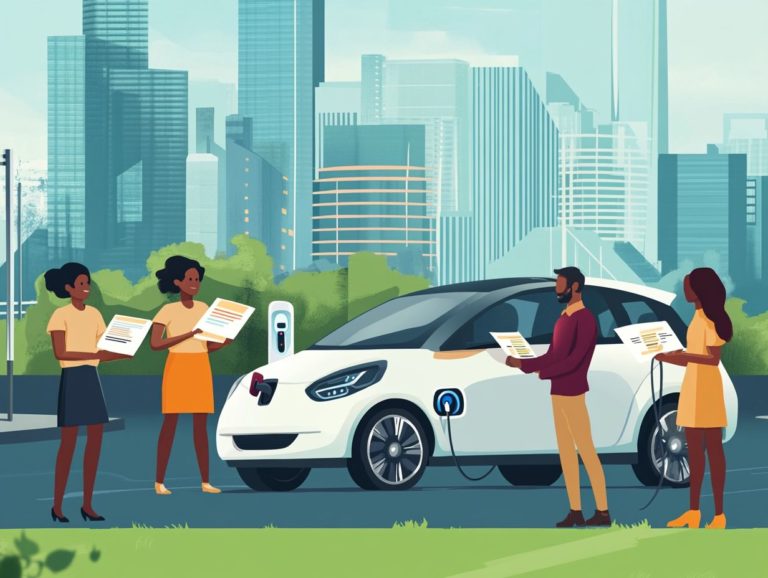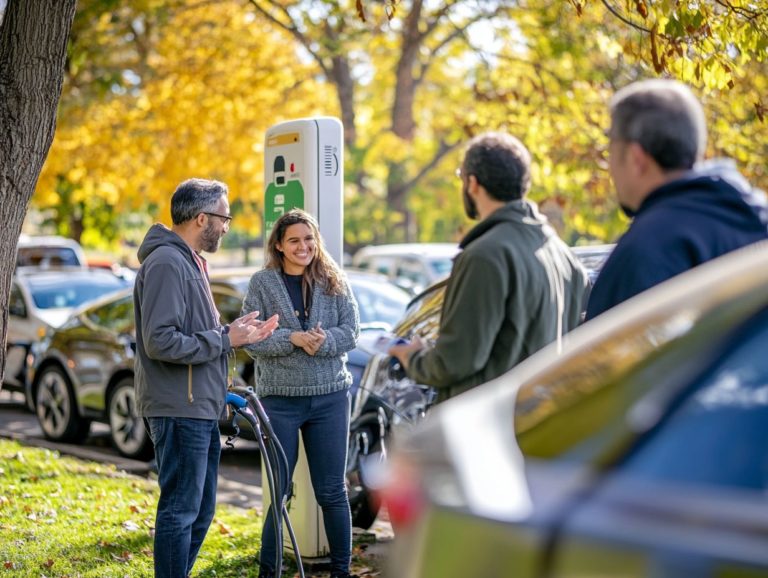The Environmental Costs of EV Battery Production
As electric vehicles (EVs) surge in popularity, grasping the environmental costs of their batteries becomes essential for you.
This article delves into the intricacies of EV battery production, illuminating the carbon emissions and pollution that come with it, alongside the depletion of vital resources.
You ll discover the efforts underway to mitigate these impacts through sustainable practices and the exploration of alternative materials.
Looking to the future, we discuss advancements and collaborative initiatives designed to make battery production cleaner and more sustainable.
Dive in now to discover the hidden costs and potential solutions within the realm of EV batteries.
Contents
- Key Takeaways:
- Overview of EV Battery Production
- Environmental Impact of EV Battery Production
- Efforts to Reduce Environmental Costs
- Future Outlook and Solutions
- Innovations and Progress in Sustainable Battery Production
- Frequently Asked Questions
- What are the environmental costs associated with EV battery production?
- How does EV battery production impact carbon emissions?
- In what ways does EV battery production contribute to water pollution?
- What resources are depleted in the production of EV batteries?
- Are there any sustainable solutions to reduce the environmental costs of EV battery production?
- Is the environmental impact of EV battery production greater than the benefits of using electric vehicles?
Key Takeaways:
- EV battery production contributes to carbon emissions and pollution, as well as resource depletion.
- Sustainable practices and alternative materials are being used to reduce environmental costs in battery production.
- Ongoing innovations and collaborative efforts show promise for a more sustainable future in battery production.
Overview of EV Battery Production
The production of batteries for electric vehicles (EVs) is a nuanced endeavor, incorporating a range of raw materials like lithium, cobalt, and nickel. Each of these materials is crucial for developing efficient and sustainable energy sources.
As the popularity of electric vehicles continues to surge, especially in markets such as India, understanding the manufacturing process and the environmental ramifications of battery production becomes imperative for advancing a greener transportation sector.
This overview will delve into the essential stages of battery production and their connection to CO2 emissions and overall vehicle efficiency.
How Electric Vehicle Batteries are Made
Electric vehicle batteries are crafted through a careful production process that begins with sourcing essential raw materials, such as lithium, cobalt, and nickel, from global reserves.
This extraction often involves mining operations across various countries, where these valuable minerals are carefully harvested from the earth and processed to meet the stringent quality standards necessary for battery production.
Once extracted, the materials undergo refining processes that consume substantial amounts of energy. This underscores the industry’s reliance on fossil fuels and the environmental implications tied to battery manufacturing.
After this refining stage, the purified materials are blended in precise ratios to create cathodes and anodes, which are parts that store and release energy. These components are then assembled into cells, culminating in the production of high-capacity batteries that power electric vehicles.
As the demand for sustainable energy solutions continues to rise, the significance of lithium reserves has skyrocketed. This surge in importance calls for innovative mining techniques and responsible sourcing practices to ensure a stable supply for future technological advancements.
Environmental Impact of EV Battery Production
The environmental impact of electric vehicle battery production is substantial. It brings forth a range of concerns, including CO2 emissions, resource depletion, and environmental degradation.
Much of this stems from the processes involved in lithium mining and the extraction of other raw materials, raising critical questions about sustainability in the industry.
Carbon Emissions and Pollution
CO2 emissions and pollution from the battery production process significantly contribute to the overall ecological footprint of electric vehicles. This underscores the necessity for sustainable practices.
When considering the extraction of raw materials like lithium, cobalt, and nickel, it becomes clear that the mining processes are not only energy-intensive but also release harmful pollutants into the environment.
The manufacturing stages, involving heavy machinery and chemical processes, emit substantial greenhouse gases, further exacerbating climate change.
While electric vehicles are promoted as a greener alternative, it’s vital to take into account the emissions associated with their production and operation within the broader context of greenhouse gases.
This interconnectedness highlights the urgent need for manufacturers to embrace cleaner technologies and enhance recycling methods to lessen their adverse impact on our planet.
Stay informed and be part of the solution for a cleaner planet!
Resource Depletion
Resource depletion driven by the extraction of raw materials for electric vehicle batteries presents a significant challenge, particularly with lithium mining and the environmental degradation that comes with it.
As regions like South America especially the Lithium Triangle, which includes parts of Argentina, Bolivia, and Chile grapple with severe water shortages and habitat destruction, the consequences of these mining activities become starkly clear.
You face a delicate balance between advancing technology and preserving natural resources, which calls for a decisive shift toward sustainable practices. Embracing innovative strategies, such as recycling lithium-ion batteries and exploring alternative battery technologies, could help ease the strain on these fragile ecosystems.
We must act now to protect our planet! It’s crucial for industries and policymakers to join forces in crafting solutions that minimize impact, ensuring that the benefits of electric vehicles don t come at the expense of our planet’s well-being.
Efforts to Reduce Environmental Costs
Your efforts to minimize the environmental impact of electric vehicle battery production are becoming more sophisticated, with a keen emphasis on sustainable practices.
By prioritizing battery recycling and exploring alternative materials, you are aligning with government targets aimed at reducing carbon footprints. This proactive approach contributes to a greener future and positions you at the forefront of innovation in the industry.
Sustainable Practices in Battery Production
Sustainable practices in battery production are essential for minimizing the environmental impact of electric vehicles. By focusing on renewable sources and responsibly sourcing lithium reserves, you can contribute significantly to environmental preservation.
Manufacturers are focusing more on the ethical sourcing of materials like cobalt and nickel, ensuring these valuable resources are extracted with a strong commitment to human rights and environmental standards. This approach reduces the social impact of mining and cultivates a transparent supply chain that you can trust.
Integrating renewable energy into manufacturing processes think solar or wind power helps you cut down on greenhouse gas emissions, presenting a comprehensive strategy for sustainability. These innovative practices showcase the industry s dedication to creating a cleaner future while addressing the growing demands for electric mobility.
Alternative Battery Materials
Research into alternative battery materials is focused on reducing CO2 emissions and minimizing the environmental impact associated with traditional battery production methods.
By exploring materials such as sodium-ion and solid-state batteries, you can enhance energy density while utilizing abundant resources that leave a lighter extraction footprint. These alternatives promise improved performance and play a crucial role in battery recycling. By reclaiming valuable materials like lithium and cobalt through advanced recycling techniques, you can significantly reduce the need for mining, ultimately lowering greenhouse gas emissions.
This holistic approach to battery development and end-of-life management can greatly contribute to reducing the carbon footprint of electric vehicles, making them more sustainable and environmentally friendly.
Future Outlook and Solutions
The future of electric vehicle battery production looks exceptionally promising, fueled by innovative advancements and strides toward sustainable production methods.
These developments are perfectly aligned with governmental targets aimed at reducing environmental impact, creating a landscape ripe with opportunity for growth and progress in this vital industry.
Innovations and Progress in Sustainable Battery Production
Innovations in sustainable battery production are reshaping the electric vehicle industry. These advancements are crucial for reducing environmental impact and driving down costs!
There is a strong emphasis on battery recycling techniques and the integration of renewable sources to boost efficiency. Companies are exploring methods to recover valuable materials like lithium and cobalt from used batteries to foster a circular economy.
Research actively pursues alternative energy sources, including solid-state and flow batteries. These types of batteries promise greater safety and longer lifespans. Solid-state batteries use a solid electrolyte instead of liquid, while flow batteries store energy in liquid electrolytes, allowing for larger capacities.
By tapping into abundant resources like sodium and increasing the use of solar and wind energy in battery manufacturing, the industry is setting the stage for a more sustainable future.
Collaborative Efforts to Address Environmental Impact
Collaborative efforts between governments, manufacturers, and environmental organizations are essential to address the environmental impact of battery production. These collaborations advance sustainable practices aligned with the electric mobility mission.
Partnerships combine diverse expertise and resources, enabling the creation of innovative recycling initiatives that extend the lifecycle of battery materials. By integrating best practices, it is possible to effectively reduce landfill waste and minimize harmful emissions linked to improper disposal.
Educational programs designed to raise awareness about the importance of proper recycling methods empower individuals to make responsible choices. Showcasing successful case studies from various regions illustrates how shared responsibility can spark meaningful change, ultimately supporting the global goal of a greener, more sustainable future.
Frequently Asked Questions
Here are some common questions about the environmental impacts of electric vehicle battery production.
What are the environmental costs associated with EV battery production?
The environmental costs of EV battery production include carbon emissions, water pollution, and resource depletion, highlighting the need to understand the environmental impact of EV manufacturing.
How does EV battery production impact carbon emissions?
EV battery production contributes to carbon emissions through the extraction and processing of raw materials, transportation, and manufacturing processes.
In what ways does EV battery production contribute to water pollution?
The production of EV batteries requires the use of toxic chemicals and heavy metals. These substances can leach into water sources and pollute them.
What resources are depleted in the production of EV batteries?
EV battery production requires the use of rare earth metals, which are finite resources. Extracting these metals can also cause environmental damage and displace local communities.
Are there any sustainable solutions to reduce the environmental costs of EV battery production?
Yes! Companies are developing more sustainable methods, such as using renewable energy sources and implementing recycling programs for used batteries.
Is the environmental impact of EV battery production greater than the benefits of using electric vehicles?
This is a complex issue, but overall, the long-term benefits of using electric vehicles outweigh the environmental costs of battery production. It is important to continue striving for more sustainable production methods.





